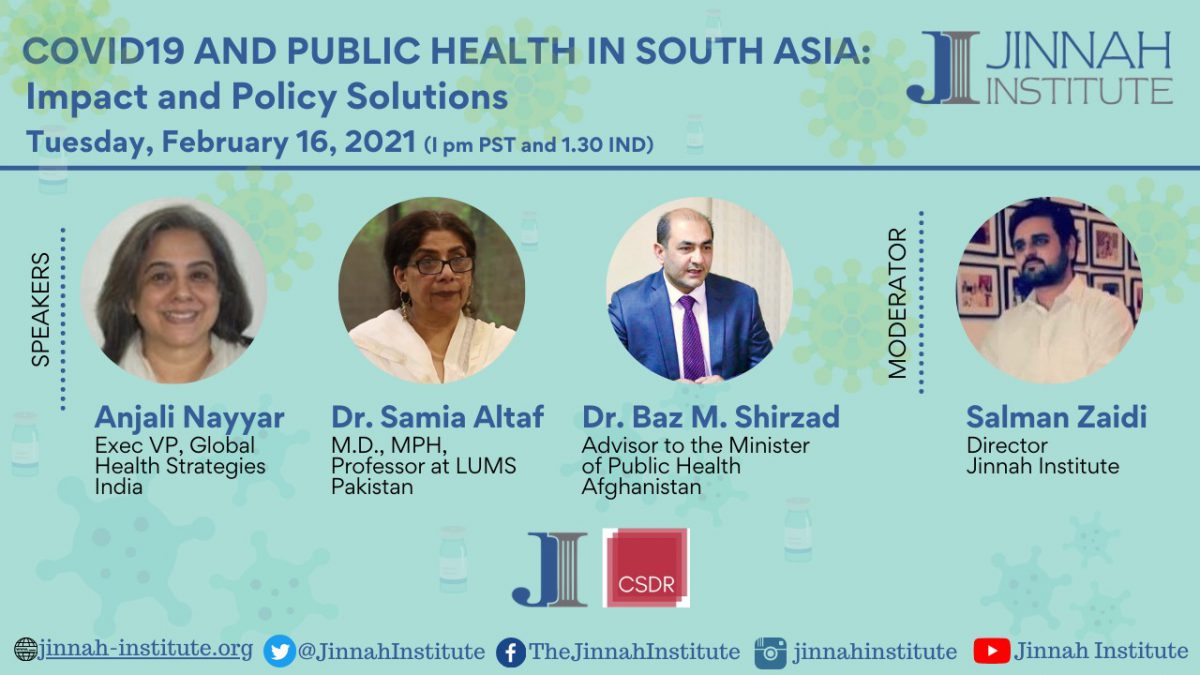Post COVID Futures: Round Table
Covid-19 and Public Health in South Asia: Impact and Policy Solutions
Date: February 17, 2021
Moderator:
-Salman Zaidi, Director Programs, Jinnah Institute
Panelists:
-Dr. Samia Altaf, M.D., MPH, Professor at LUMS Pakistan
-Ms. Anjali Nayyar, Exec VP, Global Health Strategies India
-Dr. Baz M. Shirzad, Advisor to the Minister of Public Health Afghanistan
The COVID-19 pandemic has posed significant challenges to healthcare systems all over the globe, however, the challenges posed to developing countries, particularly in South Asia, have been of a different nature, discussed public healthcare experts from Pakistan, Afghanistan and India at Jinnah Institute’s task force on Post-Covid Futures in South Asia and the Impact on Public Health. Discussing how the vaccine rollout has been progressing in Afghanistan, Dr. Shirzad pointed out that while Afghanistan has agreements in place to receive vaccines from India, China, and via the COVAX program, communication and social mobilization continue to pose serious challenges. Convincing individuals to overcome their fears surrounding vaccination is a significant hurdle. He added that the challenges facing the Afghan government met were paralleled to the Polio vaccination drive.
Reflecting on social attitudes towards the vaccine in Pakistan’s context, Dr. Samia Altaf noted that the situation is similar to Afghanistan when it comes to mistrust surrounding the vaccine. Pakistan too has faced numerous challenges with regards to its polio vaccination drive. Unless there is widespread acceptance of the vaccine amongst the population, the vaccination drive cannot be successful. This is an issue of concern as the Pakistan government has not done enough to share up-to-date and complete information regarding the vaccine and its importance. She lamented the fact that the vaccine procurement process was mis-managed and had further contributed to the confusion as it was not completely regulated by the government with private actors getting involved in the mix. Dr. Altaf also pushed back against the perception that the vaccine is a panacea. Though it certainly has an integral role to play, it is only one component of a much larger picture.
The situation in India however seems to be quite different compared to its neighbours. Ms. Anjali Nayyar explained that India has the experience of conducting one of the largest immunization drives which had proved quite successful. As a result, the health workers are very well versed with the vaccination process. The big challenge, however, is the fact that health workers have not been coming in for the second round of vaccines. This primarily has to do with the lack of information campaigns about the process. It is also important to dispel vaccine misinformation in order to instill confidence in the people.
On the coping ability of countries in the region to better equip themselves with data and gain a better understanding of their healthcare supply-chains, Dr. Altaf stated that Pakistan unfortunately fares poorly, with very poor operational systems. She explained that Pakistan lacks adequate data gathering and analysis facilities. On the Afghanistan side, it remains to be seen whether a country in the process of rebuilding itself can maintain a minimum level of emergency response during this pandemic, said Dr. Shirzad. He further added that it is imperative to focus on rural areas and not just urban centers when it comes to vaccine distribution and supply chain management. Despite India’s experience with the immunization programme, a vaccine roll-out for such a vast population will be a tall task in any context, let alone during this pandemic. Ms. Nayyar however explained that India has benefited from the use of technology to monitor and ensure undisrupted supply chains of the COVID vaccine.
Mr. Salman Zaidi, Director Programs Jinnah Institute, posed the question of whether countries have learned from the COVID experience and if there has been a shift in fundamental health indicators. Dr. Altaf was of the view that Pakistan has displayed a tendency to lurch from one health crisis to the other. Countries with established systems and the requisite infrastructure deal better with such crises. Unfortunately, Pakistan lacks those very key elements and had to reroute a significant amount of resources at the expense of other sectors. She opined that that it is crucial for Pakistan to assess where it stands and how the current infrastructure can be improved in order to cope with future challenges.
The healthcare infrastructure in India as well requires a lot of investment, stated Ms. Nayyar, and stressed that countries in South Asia need to collaborate much more going forward. A number of countries in the region are resource constrained, therefore it is important to talk to one another, share best practices, and come up with way to better support each other through such crises. While the pandemic was a health emergency, it ended up having a devastating impact on the economy and other sectors. She argued that multilateral organisations and forums could play a role in getting technical experts to work on pandemic preparedness. Agreeing with her co-panelist, Dr. Altaf advocated for a freer exchange of people between the three countries. The exchange should not be limited to just health experts, but people from different walks of life, because so many of the challenges we face today are shared.
Follow the link to watch full video:
